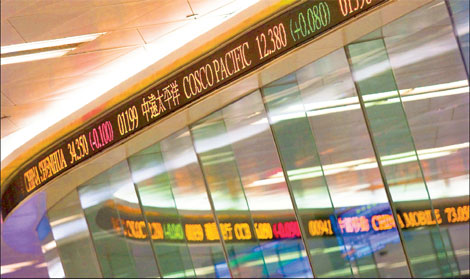HKEx failure to develop dark pool trading could be costly
Updated: 2010-09-15 07:15
By Oswald Chen(HK Edition)
|
|||||||
|
An electronic ticker displays stock prices at Hong Kong Exchanges & Clearing Ltd's trading floor. Analysts say Hong Kong may be outshone by regional rivals such as Singapore if it fails to introduce dark pool trading. Jerome Favre / Bloomberg News |
Bourse operator's lack of interest worries analysts
Hong Kong's failure to develop dark pool trading could see its stock exchange falling behind other regional bourses in terms of market development, analysts have warned. Dark pool trading is essentially a way for traders to move a large number of shares without having to reveal themselves to the market.
At its interim results press conference in July, Hong Kong Exchanges and Clearing (HKEx) said that it has no plans to introduce a platform for dark pool trading in the city. It believes penetration in Asia is still far too low to make an impact. However, the Stock Exchange of Singapore and Chi-X Global Inc, a global provider of market infrastructure technologies and trading venues, signed an agreement in August to develop and launch the first exchange-backed dark pool trading service in the Asia-Pacific region.
"It is possible that other Asian bourses such as the Singapore exchange will be able to capture dark pool trading business from Hong Kong if HKEx does not take a proactive stance on this issue," Millennium Asset Management Director Patrick Shum told China Daily. "If this situation continues, it may let the Singapore exchange develop an over-the-counter trading business of Hong Kong stocks."
Another local securities trader, who declined to be named, criticized HKEx as being more concerned about issues such as market capitalization and the number of listed companies rather than promoting market efficiency by increasing liquidity and turnover.
"It is the low liquidity and turnover of the local stock market that leads to the rise of an over-the-counter market in equity and derivatives trading," the trader said, adding that one way HKEx can enhance market efficiency is by abolishing stamp duties.
Millennium Asset's Shum also said that the addition of dark pool trading will generate additional revenue streams for stock exchanges as trades are still legally required to be reported.
However, Shum admitted that the rise of dark pool trading will increase short-term market volatility because of high-frequency trading that is prejudicial towards retail investors due to information asymmetry in the market.
Dark pool trading is a major over-the-counter trading strategy that facilitates equity transactions to take place outside of traditional exchanges. The main purpose of dark pool trading is to ensure that traders are able to access liquidity while preserving their anonymity by masking trading information flows such as bid/ask spreads, the identity of the traders and the details of the executed trades.
The prices are only disclosed after the trades are executed, which helps institutional investors to buy or sell large orders without running the risk other traders will work out what is going on and put the price either up or down to take advantage of the order.
However, there has been criticism that the lack of transparency and the inevitable fragmentation of trading could lead to less efficient pricing in traditional open stock exchanges.
According to the statistics of the Financial Services and the Treasury Bureau, dark pool transactions in the local stock market amounts to less than 3 percent of the total market turnover in the city.
However, there is growing evidence that it is gaining favor among investors. Last month, German investment bank Deutsche Bank joined the ranks, including UBS and Nomura, by introducing a dark pool trading platform in Hong Kong in order to tap growing demand in the region.
Deutsche Bank's dark pool trading platform, the Deutsche Bank Automated Trading System (DBATS), will run concurrently with a dark liquidity-seeking algorithm, Super X, in which clients will in time be able to access other Asian dark pool markets.
Deutsche Bank stressed that because spread costs in Asia are relatively high compared to the American and European markets, dark pool trading can give clients access to greater liquidity, reduce market impact and improve trading efficiency in the region.
China Daily
(HK Edition 09/15/2010 page3)
